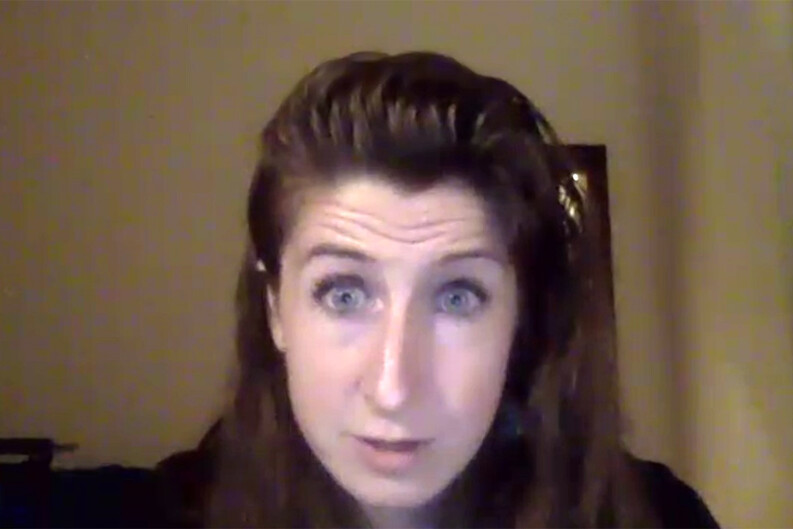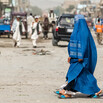Human Rights Workshop: Kristine Beckerle ’15 Recounts Justice Efforts for Yemen

At the February 26, 2021, Human Rights Workshop, titled “Yemen, Justice and the Biden Administration,” Kristine Beckerle ’15 discussed her work advocating for accountability and justice for Yemen. For the past two years, as Legal Director, Accountability and Redress, for the independent Yemeni rights organization Mwatana for Human Rights, Beckerle has worked to advocate against human rights violations, arms sales that fuel the conflict, and other behavior that endangers Yemeni civilians. She expressed hope for peace in Yemen, but said justice is needed, and acknowledged that achieving this is not an easy task.
“It’s not that hard for the Biden administration to...suspend relevant weapons sales,” Beckerle said. “It’s a lot harder for them to choose to lower their discretion when it comes to engaging basically in war with partners across the globe...accountability is acknowledgment that people don’t get to do things to Yemeni civilians and just walk away without it mattering.”
Beckerle provided context on the conflict in Yemen, highlighting that it is “not one war,” but instead, “a series of overlapping conflicts that are very messily intertwined.” Locally, she said, the Houthi armed group “has controlled large swathes of territory and the vast majority of the population.” Because they are the governing force for much of the Yemeni population, Beckerle argued, the “way in which the Houthis are thinking about rights and their obligations has an effect” on the lives of many Yemeni civilians. In addition to the fighting between Houthi fighters and Yemen’s government is the involvement of the Saudi/United Arab Emirates-led coalition, which Beckerle described as imposing both an “aerial and naval blockade,” and which the United States has aided since March 2015.
“The decision to enter the Yemen War and how the U.S. entered into the Yemen War was taken during the Obama administration,” Beckerle noted. “Trump policy in Yemen was a continuation of Obama policy in Yemen, not an aberration.” In the simultaneous conflicts, she said, there has been “extensive civilian harm...and there’s been no credible accountability.”
As a case study in human rights advocacy, Beckerle discussed the focus on arms sales in the Yemen conflict and the pressure on complicit actors such as the U.S. government “as a way of thinking about leveraging points of access and the role of secondary targets.” In order to incentivize the “primary perpetrators” of the conflict — the Saudi, Emirati, and Yemeni governments — to stop harming civilians, civil society engaged in a “heavy amount of documentation” linking U.S. and EU arms to civilian harm in Yemen, she said. Because Saudi Arabia and the UAE cared about their relationship to the western powers, Beckerle explained, and the western powers cared about being implicated in civilian harm in Yemen, shaming complicit countries was a strategic way for civil society to influence direct perpetrators of violence. To establish a link, human rights investigators traveled to the sites of air strikes, documented remnants of bombs, and sometimes were able to identify their place and date of manufacture. They could thus demonstrate that the western manufacturers likely knew “there was a risk the weapon would be used in ways not compliant with international law.”
While Beckerle pointed to the attention paid to Yemen in European and American media outlets as an important success resulting from this strategy, she also noted that, sometimes, “people [in western countries] were ...more interested in the weapon of the attack than the civilian harm.”
WATCH THE PRESENTATION:
As part of accountability efforts for Yemen, Beckerle detailed the dynamic between international and local action, and how that dynamic has influenced efforts for justice. In the Yemeni context, accountability and reparations go beyond “remedying harms”; she described how after the Arab Spring in 2011, Yemen’s former president, Ali Abdullah Saleh, was afforded an “immunity deal” that allowed him to remain in the country, act as a “political spoiler,” and align himself with the Houthis. “Many Yemenis draw a straight line between this immunity decision and today’s conflict,” Beckerle explained. Accountability can take different forms, Beckerle said, but “there needs to be some sort of formal step to acknowledge something bad happened and make sure it doesn’t happen again...we need to memorialize the harm and offer payment before we can say we’ve learned the lesson.”
The mechanism through which accountability would be achieved, however, is a different question to Beckerle. In Yemen, “the court system [in Yemen],” she said, “is decimated, controlled by two, if not three, governing authorities...and the warring parties are not interested in accountability.” As a result, advocates have resorted to pushing questions of justice and accountability at the international level. This strategy has been complicated by the fact that, since 2015, Beckerle said, the word “accountability” disappeared from the U.N. Security Council’s vocabulary. She attributed this shift to the U.S. “shielding Saudi Arabia and the UAE diplomatically.” Individual sanctions, though a “fair response” according to Beckerle, would not necessarily have a “practical impact” on the Houthis given that many do not travel or have bank accounts abroad.
The Yemeni government initiated its own investigation of violations; however, Beckerle suggested its efforts have provided little benefit to Yemeni civilians and were largely a strategy to avoid and delegitimize international scrutiny. Beckerle pointed out that the U.N. Human Rights Council opened an investigation into the conflict in 2017, and it is subject to renewal annually, a period during which the Saudi-led coalition routinely argues for its discontinuation on the grounds that local efforts to investigate violations have emerged. (Beckerle acknowledged that the Yemeni national commission, though not an independent body, did feature some committed individuals who documented the conflict seriously and comprehensively, and had used the existence of international investigations to push for more holistic reporting on their side.)
Another effort by perpetrators to lessen international involvement includes, she said, an ad hoc system of condolence payments to victims of air strikes; in reading through private meeting minutes between the Yemeni government and the Saudi-led coalition, Beckerle noted that they explicitly aimed to announce this “payment scheme” before the U.N. Human Rights Council met to discuss Yemen in order to diminish international pressure. Even so, Beckerle acknowledged, the payments provide some measure of assistance to victims: “Payments are not enough, but they’re not nothing.”
Beckerle offered concluding remarks on challenges and lessons learned in advocating for justice in Yemen. “For the first time since 2015,” she said, “the U.N. Security Council used the word ‘accountability’ in a resolution.” Beckerle believes this shift is a step in the right direction. On the arms sales, she recognizes that states’ withdrawal from these sales is a testament to not only the power of civil society, but also the power of international coalitions and solidarity. The goal, she emphasized, remains to end civilian harm and human rights violations.


